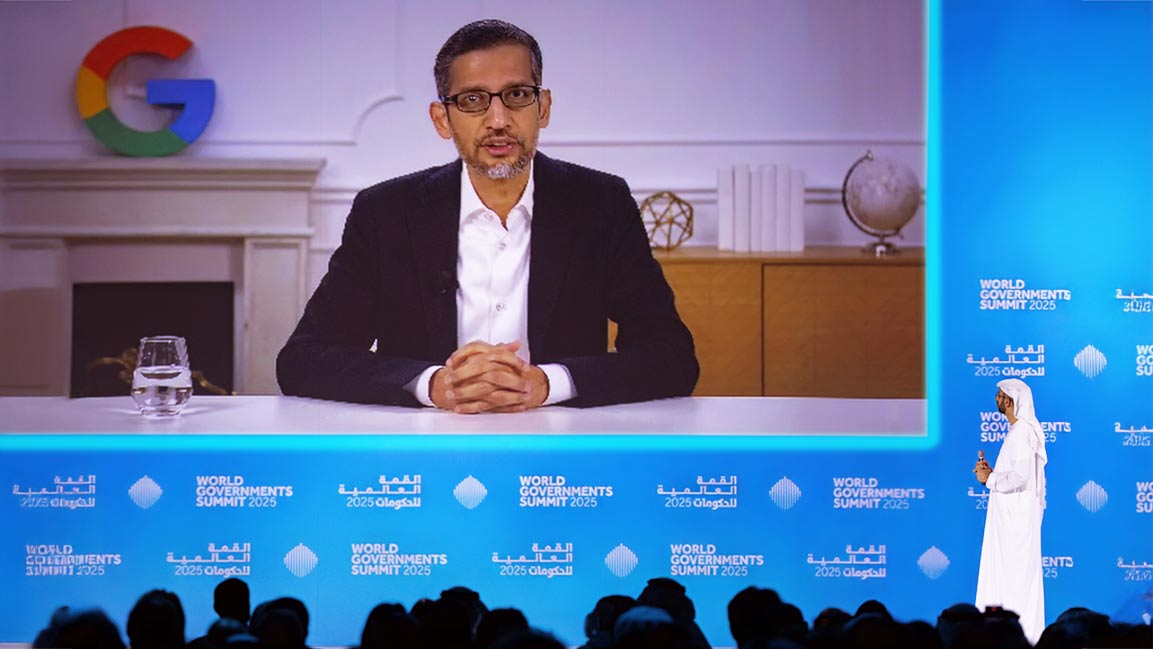- | 11:00 am
Google CEO Sundar Pichai discusses AI, quantum computing, and innovation at World Governments Summit
"Intelligence is going to be widely available. This technology is going to be at everyone's fingertips, and it's going to impact the world profoundly,” Pichai said.

As part of the World Governments Summit, Google and Alphabet CEO Sundar Pichai joined H.E. Omar Al Olama, UAE Minister of State for Artificial Intelligence, Digital Economy, and Remote Work Applications, in a virtual fireside chat to discuss Google’s AI-first strategy, long-term investments in foundational technologies such as quantum computing and Waymo, and the company’s continued commitment to technological innovation.
Pichai highlighted Google’s dedication to integrating artificial intelligence into its ecosystem, emphasizing that AI is the driving force behind the company’s most widely used products. “We are building applications that make AI truly helpful to people everywhere,” he said, pointing out that Google’s AI innovations power essential services like Maps, Search, and Android, reaching billions of users worldwide.
“Intelligence is going to be widely available. This technology is going to be at everyone’s fingertips, and it’s going to impact the world profoundly,” Pichai said.
Discussing quantum computing, Pichai highlighted its potential to revolutionize industries, noting the remarkable advancements Google has made in the field. “The progress in quantum is palpably exciting. In a 5 to 10-year timeframe, I think we will start seeing practically useful quantum computers,” he said.
He emphasized that while quantum computing is still in its early stages, its implications are vast, particularly in areas like encryption and computational power. “Our latest breakthrough enabled us to perform a computation in five minutes that would have taken one of the world’s fastest supercomputers over 10 septillion years,” he said.
Reflecting on Google’s growth, Pichai credited the company’s culture of innovation for its success. “Our founders set a very ambitious framework for the company. You have to have an optimistic culture, a culture of curiosity,” he said. He also acknowledged the need for adaptability, recognizing that not all projects succeed but contribute to the company’s broader learning process.
“In 2015, when I became CEO, I said the company was going to be AI-first, and we decided to take a full-stack approach to AI. When you make long-term technology bets—AI, Waymo, Quantum—you know it will eventually happen. At that foundational layer, you take a long-term view and don’t waver at all,” Pichai added.
However, he noted the importance of knowing when to pivot. “At the application layer, there’s judgment. Some efforts succeed, and some don’t. The key is knowing when to push through and when to course-correct. We don’t always get it right, but that process keeps the company fresh and constantly innovating.”
Despite the rise of new AI-driven search platforms, Pichai remains confident in Google’s continued dominance. “Broadly, we are in the business of providing information to people. People’s information needs are exploding, and we continue to see strong growth in Search,” he said.
He noted that Google has evolved its search capabilities through AI advancements, such as AI overviews, which enhance user engagement. “Taking the long-term view, AI is going to expand the opportunity space, not just for us but for others working in the space. We expect to be a leading player, but there will naturally be others as well.”
The discussion also touched on Waymo, Google’s self-driving car division. Pichai highlighted its safety-focused approach, citing significant milestones. “We now have over 33 million rider miles driven, and Waymo had 78% fewer injury-causing crashes compared to human drivers. Last year, Waymo served over 4 million passenger trips,” he said.
“We aim to scale up to 10 new cities in 2025, and we’ll be conducting our first international testing in Japan. We want to work with innovative countries to bring this technology to more people.”
H.E. Omar Al Olama expressed interest in bringing Waymo to the UAE, to which Pichai responded positively, suggesting potential collaboration. Addressing concerns about AI-driven automation replacing jobs, Pichai emphasized that technological advancements create new opportunities. “A study by MIT economist David Autor found that since 1940, 60% of the new jobs created didn’t exist before that. Just as the internet led to the rise of content creators, AI will generate many new opportunities,” he said.
He predicted that human experiences and interactions will gain greater value as AI evolves. “While AI will enhance productivity and cause some disruption, it will also open the door to many new types of opportunities,” Pichai said.
Pichai shed light on Google’s approach to experimentation and innovation. “We encourage people to work on ambitious things. Even if we don’t achieve our goal, the process itself generates valuable learnings,” he said.
He acknowledged that Google has discontinued numerous projects over the years, emphasizing the importance of strategic decision-making. “When making long-term technology bets, like AI and Quantum, we remain committed. But at the application layer, we assess whether an effort is gaining traction or if we need to course-correct,” he said.
Closing the discussion, Pichai reiterated his current focus on AI. “At this moment, I’m spending a lot of my time on AI. The rate of progress and the profound impact of the technology are unlike anything we’ve seen before,” he said.































